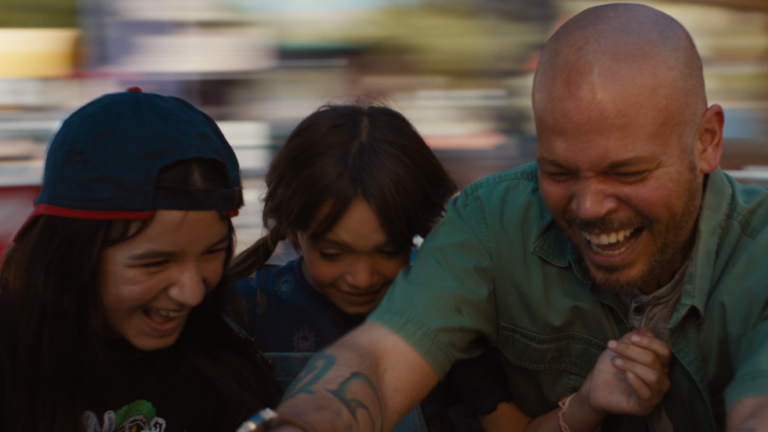
Both good and bad instances of parenting can have a lasting effect on children. They don’t necessarily know what to expect, though those with separated parents can compare the actions and expressed sentiments of the two or look to their friends or extended family for other examples. But, ultimately, each relationship is individual, and even the slightest bit of affection from an otherwise absent parent can completely fulfill and positively overwhelm child for a fleeting moment. In the Summers looks at a few key points of the sometimes magical, sometimes malicious interactions between one father and his two daughters over the years.
Violeta (Dreya Renae Castillo) and Eva (Luciana Quinonez) go to visit their father Vicente (René Pérez Joglar), whose behavior is hardly the most responsible but who is insistent on showing his daughters a good time. As they age, Violeta (Kimaya Thais Limòn) and Eva (Allison Salinas) return for more experiences, and when they are much older, Violeta (Lio Mehiel) and Eva (Sasha Calle) have a much clearer understanding of who their father is and what he tried, and occasionally succeeded, to do for them throughout their unstable and inconsistent relationship in their intermittent meetings.
This film is grounded by an alternately commanding and vulnerable performance from Joglar, also known as Residente, who portrays Vicente in all time periods opposite these three separate slates of talented actresses. He’s the kind of person who will snap when he feels threatened but also wants his daughters to feel safe around him, and negotiating that protective nature with an aggressive temper permanently remains a challenge for him. He wants to be liked but also to teach his daughters hard lessons about the real world and what’s sometimes necessary to survive.
In the Summers marks a resounding feature debut from writer-director Alessandra Lacorazza Samudio, whose past credits include editing the Oscar-shortlisted documentary short After Maria. She brings a sensitivity to her approach that allows Vicente to be framed as heroic in the eyes of his daughters while still very transparently showing all of his flaws, permitting him to remain human while combating the impulses that threaten to keep him away from the daughters he loves with everything he has.
Utilizing three different sets of actresses to portray the same roles is always a gamble, but this film absolutely pulls it off. Part of the credit is surely due to Joglar, who interacts with the characters in the same way regardless of who’s playing them and maintains some stability for the audience. But there is also clearly an effort that has been made to ensure that they feel enough like the same people, with a few new life experiences and milestones achieved to subtly affect the ways in which they open themselves up to potential harm from their father, who only wants to give love but still often adds more than they might be able to handle by showing them all of himself.
In the Summers took home the U.S. Dramatic Grand Jury Prize at the Sundance Film Festival this past January and has recently been acquired by Music Box Films for a release later this year. It’s a story that should resonate with all audiences even if they grew up in two-parent homes without much conflict since Vicente’s passion, however misplaced and improperly expressed in certain cases, is so potent and strong. This is a story of family love that manifests in a number of sometimes productive ways, raw, honest, and quite poignant in its exploration of the evolution of relationships and the staying power of connection.
Grade: B+
Check out more of Abe Friedtanzer’s articles.
In the Summers makes its New York premiere in the Spotlight Narrative section at the 2024 Tribeca Festival.

